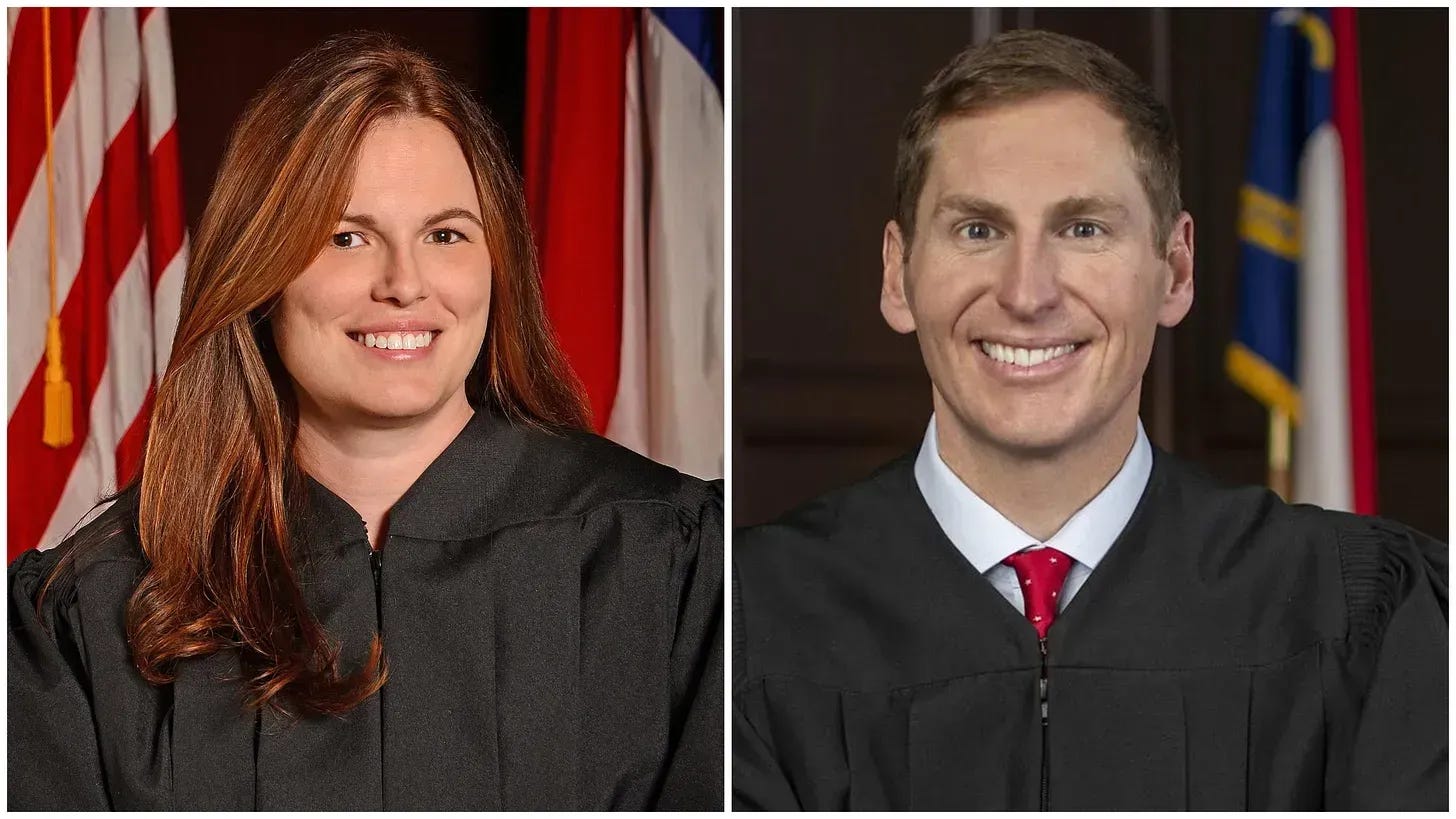NC Supreme Court race won't go to third recount. Why Democrats still fear the results could be overturned
A partial hand recount reaffirmed an apparent win for NC Supreme Court Justice Allison Riggs. But election protests could still work their way to a GOP-controlled Supreme Court and overturn the race.

The North Carolina State Board of Elections announced on Tuesday that there wouldn’t be a statewide hand recount for the highly contentious state Supreme Court race.
After all counties reported their results last month, Democratic Supreme Court Justice Allison Riggs led Republican Court of Appeals Judge Jefferson Griffin by 734 votes. Griffin then requested a recount, which concluded with him trailing by an identical 734-vote margin. He then asked for a partial hand recount of the ballots in 3% of the Election Day precincts and early voting sites in each county.
Under state law, for a full hand recount to be ordered, Griffin would have had to pick up at least 35 more votes than Riggs. With the final county concluding its second recount on Tuesday, Riggs netted a total of 14 votes. That means there will be no statewide hand recount.
“This victory shows our democracy in action, and the recount process demonstrates that our elections are incredibly well-run,” Riggs said in a statement. “I urge all of us to turn our attention to delivering justice for the people of North Carolina.”
But the race still hasn’t been called, and there is a mechanism for Griffin to get the election overturned if he is successful in his ongoing efforts to challenge the ballots of more than 60,000 voters.
On Wednesday afternoon, the State Board of Elections will meet to consider Griffin’s election protests. But whatever the board decides could very well be challenged in Wake County Superior Court, and ultimately appealed to the state Supreme Court, where Republicans presently have a 5-2 majority.
The partisan makeup of the state high court is prompting fear among Democrats that the Supreme Court election could effectively be stolen from Riggs.

During a news conference on Tuesday, North Carolina Democratic Party Chairwoman Anderson Clayton said Republicans have already demonstrated their desire to stymie incoming statewide Democrats.
Clayton cited Senate Bill 382, a measure that’ll be considered on Wednesday to curb the powers of the incoming Democratic governor, lieutenant governor, attorney general and state superintendent of public instruction.
"Are you seriously thinking that they would not be this manipulative and this malicious with the people and the power that they hold right now in this state?” Clayton asked. “Do I have fear? Absolutely. Are we gonna do everything in our power to protect these voters and the democracy that we currently still have? ... Yes."
But Republicans insist they are merely exercising their right to go through the elections process to ensure every vote was lawfully cast.
“Theatrics from the NC Democratic Party chair aside, we are committed to ensuring that all legal votes are counted and believe these protests should succeed,” said Matt Mercer, a spokesman for the NCGOP and Griffin campaign. “The failure here is on the State Board of Elections and their inconsistent and uncooperative stance on election integrity. Any actions in the court system are speculative and not something we are focused on today.”
Republicans are well within their right to go through the recount process, and there have indeed been technical inconsistencies in a handful of counties, including in the recording of mail-in and provisional ballots. But the volume of GOP challenges and the party’s continued unwillingness to accept what appears to be a defeat for Griffin this late into the process is unusual.
An odd election

Similar legal claims challenging ballots with incomplete demographic information have been rejected by courts. And there’s little precedent for statewide challenges creating such a drawn-out process that is ultimately decided by an entity other than the State Board of Elections.
A contentious 2004 superintendent race resulted in the General Assembly upholding the Democratic candidate’s victory and swearing in the winner after nearly 10 months of recounts and legal challenges.
But that’s not applicable to this year’s Supreme Court election because the General Assembly can only resolve contested executive and legislative races, not judicial races. The resolution of judicial races is up to the courts themselves.
Keep reading with a 7-day free trial
Subscribe to Anderson Alerts to keep reading this post and get 7 days of free access to the full post archives.



